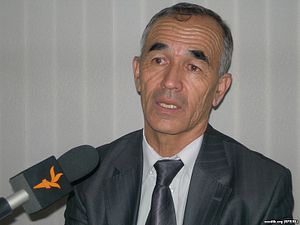The review by the Kyrgyz Supreme Court of jailed human rights activist Azimjon Askarov ‘s case closed Tuesday with a result sure to disappoint activists and the UN. Askarov’s life sentence was reversed and a new trial ordered, to be taken up by a lower court in the Chui region where Askarov is in detention. The court’s decision does not entail Askarov’s release and looks to mire the 65-year old, who has been in poor health, in further legal proceedings.
To say the least, this isn’t what the UN Human Rights Committee called for in its April recommendation regarding Askarov’s complaint that his rights had been violated. The human rights body called for Askarov’s immediate release, finding that he’d been “arbitrarily detained, held in inhumane conditions, tortured and mistreated, and prevented from adequately preparing his trial defence.”
Amnesty International said the court’s failure to release Askarov “is an egregious example of how Kyrgyzstan is failing to implement its international obligations.”
The first day of the hearing, Monday, ended with little progress as the judges said they could not proceed without testimony from the victims.
On Tuesday, a group of people from southern Kyrgyzstan were presented as victims of Askarov’s crimes. They were invited to speak by the presiding judge and later interrupted the proceedings by shouting at Askarov’s lawyers. 24.kg reported that the relatives of the policeman whose murder Askarov was convicted of participating in “began to insult [Askarov’s lawyer, Nurbek Toktakunov] and shouting that he is defending the murderer, and promised ‘a murder for a murder.’” This was after demanding that he speak in Kyrgyz and cursing human rights defenders as “nor patriots.” EurasiaNet noted after the first day that Toktakunov spoke in Russian before the court, while the state officials spoke in a mix of Russian and Kyrgyz.
A Kyrgyz media outlet, Zanoza, recorded the tense courtroom during a break. As the judges withdrew to deliberate around 11 am local time, shouting started up. The wife of the slain policeman reportedly threatened to burn Askarov if he were released, according to a tweet from Tolekan Ismailova, a Kyrgyz activist.
Askarov was not present for either day of the hearing.
The court appeared to put stock in evidence dismissed by the UN HRC while itself dismissing Askarov’s claims (backed by the UN investigation) that he’d been tortured to obtain a confession. According to 24.kg, the state saw “no reason to release Azimjan Askarov on recommendations of the UN Committee on Human Rights.” The state cited the testimony of more than 100 witnesses incriminating Askarov; but in its review the UN HRC noted that “although investigators interviewed more than 100 law enforcement officers, judge, court clerks and prosecutors, they failed to interview the author’s lawyers, human rights defenders who visited the author in detention and his relatives.”
By punting the case to the Chui regional court, Kyrgyzstan is avoiding fully implementing the UN HRC’s recommendation. A new trial very well may proceed as Askarov’s previous trials–with the state discounting evidence of torture and dismissing evidence contrary to the previous verdicts. As I noted yesterday, Askarov’s case is a flashpoint for the state, a source of immense tension: between the country’s international obligations and the nasty realities of local politics. The case carries not just personal weight–certainly for the families of the murdered policeman who wholeheartedly believe Askarov guilty and for Askarov’s family and friends who attest to his innocence–but also international weight.
Last year the United States touched off a breakdown in relations with Kyrgyzstan by giving Askarov a human rights defender award. The move was celebrated by rights advocates often critical of the United States’ strategic patience doctrine toward the Central Asian region and its propensity to prioritize security issues over rights issues, but condemned by the Kyrgyz government as an affront to its sovereignty.
There are few paths forward for Kyrgyzstan that don’t result in at least a loss of face on some level. Should the Chui court surprise and roll back Askarov’s conviction, releasing him, those convinced of his guilt will be angry–accusations of Western meddling in Kyrgyz affairs would be sure to follow and eyes will be on the south to monitor for a potential uptick in tensions. On the other extreme, should Askarov’s conviction be maintained, and presumably his life sentence re-imposed, Kyrgyzstan will suffer a reputational cost–at least in the West. This has larger implications for the state, beyond the usual recriminations. As Toktakunov argued during Monday’s portion of the hearing, Kyrgyzstan has been seeking the extradition of Maxim Bakiyev, the son of its former President Kurmanbek Bakiyev. Maxim has applied for asylum in the UK. How does this relate to the Askarov case? The British are unlikely to extradite a man–no matter how guilty he may be–to a country that refuses to comply with UN recommendations and has a demonstrated record of torture.
German Chancellor Angela Merkel is visiting Kyrgyzstan on July 13-14 and rights activists have their eyes on her, hoping she’ll press Askarov’s case behind closed doors.
































